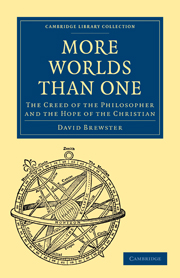Book contents
- Frontmatter
- Contents
- PREFACE
- INTRODUCTION
- CHAP. I Religious Aspect of the Question
- CHAP. II Description of the Solar System
- CHAP. III The Geological Condition of the Earth
- CHAP. IV Analogy between the Earth and the other Planets
- CHAP. V The Sun, Moon, Satellites, and Asteroids
- CHAP. VI The Motion of the Solar System round a distant Centre
- CHAP. VII Religious Difficulties
- CHAP. VIII Single Stars and Binary Systems
- CHAP. IX Clusters of Stars and Nebulæ
- CHAP. X General Summary
- CHAP. XI Reply to Objections drawn from Geology
- CHAP. XII Objections from the Nature of Nebulæ
- CHAP. XIII Objections from the Nature of the Fixed Stars and Binary Systems
- CHAP. XIV Objections from the Nature of the Planets
- CHAP. XV The Future of the Universe
CHAP. I - Religious Aspect of the Question
Published online by Cambridge University Press: 29 August 2010
- Frontmatter
- Contents
- PREFACE
- INTRODUCTION
- CHAP. I Religious Aspect of the Question
- CHAP. II Description of the Solar System
- CHAP. III The Geological Condition of the Earth
- CHAP. IV Analogy between the Earth and the other Planets
- CHAP. V The Sun, Moon, Satellites, and Asteroids
- CHAP. VI The Motion of the Solar System round a distant Centre
- CHAP. VII Religious Difficulties
- CHAP. VIII Single Stars and Binary Systems
- CHAP. IX Clusters of Stars and Nebulæ
- CHAP. X General Summary
- CHAP. XI Reply to Objections drawn from Geology
- CHAP. XII Objections from the Nature of Nebulæ
- CHAP. XIII Objections from the Nature of the Fixed Stars and Binary Systems
- CHAP. XIV Objections from the Nature of the Planets
- CHAP. XV The Future of the Universe
Summary
Before Christianity shed its light upon the world, the philosopher who had no other guide but reason, looked beyond the grave for a resting-place from his labours, as well as for a solution of the mysteries which perplexed him. Minds, too, of an inferior order, destined for immortality, and conscious of their destination, instinctively pried into the future, cherishing visions of another world with all the interests of domestic affection, and with all the curiosity which the study of nature inspires. Interesting as has been the past history of our race,—engrossing as must ever he the present,—the future, more exciting still, mingles itself with every thought and sentiment, and casts its beams of hope, or its shadows of fear, over the stage both of active and contemplative life. In youth we scarcely descry it in the distance. To the stripling and the man it appears and disappears like a variable star, shewing in painful succession its spots of light and of shade. In age it looms gigantic to the eye, full of chastened hope and glorious anticipation; and at the great transition when the outward eye is dim, the image of the future is the last picture which is effaced from the retina of the mind.
But however universal has been the anticipation of the future, and however powerful its influence over the mind, Reason did not venture to give a form and locality to its conceptions; and the imagination, even with its loosest reins, failed in the attempt.
- Type
- Chapter
- Information
- More Worlds Than OneThe Creed of the Philosopher and the Hope of the Christian, pp. 9 - 20Publisher: Cambridge University PressPrint publication year: 2009First published in: 1854



